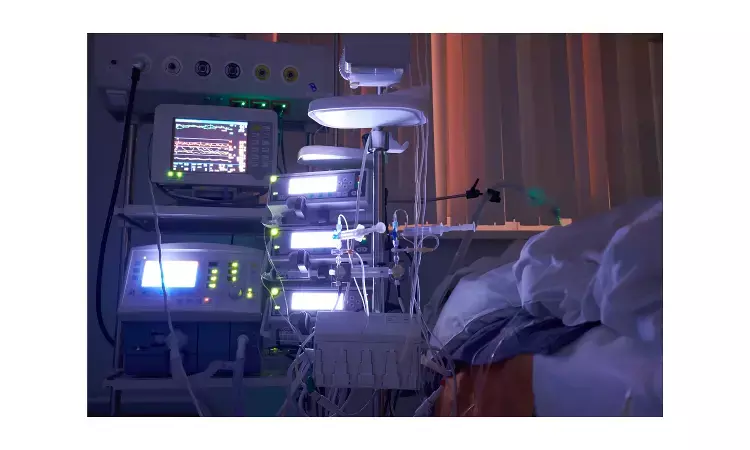- Home
- Medical news & Guidelines
- Anesthesiology
- Cardiology and CTVS
- Critical Care
- Dentistry
- Dermatology
- Diabetes and Endocrinology
- ENT
- Gastroenterology
- Medicine
- Nephrology
- Neurology
- Obstretics-Gynaecology
- Oncology
- Ophthalmology
- Orthopaedics
- Pediatrics-Neonatology
- Psychiatry
- Pulmonology
- Radiology
- Surgery
- Urology
- Laboratory Medicine
- Diet
- Nursing
- Paramedical
- Physiotherapy
- Health news
- Fact Check
- Bone Health Fact Check
- Brain Health Fact Check
- Cancer Related Fact Check
- Child Care Fact Check
- Dental and oral health fact check
- Diabetes and metabolic health fact check
- Diet and Nutrition Fact Check
- Eye and ENT Care Fact Check
- Fitness fact check
- Gut health fact check
- Heart health fact check
- Kidney health fact check
- Medical education fact check
- Men's health fact check
- Respiratory fact check
- Skin and hair care fact check
- Vaccine and Immunization fact check
- Women's health fact check
- AYUSH
- State News
- Andaman and Nicobar Islands
- Andhra Pradesh
- Arunachal Pradesh
- Assam
- Bihar
- Chandigarh
- Chattisgarh
- Dadra and Nagar Haveli
- Daman and Diu
- Delhi
- Goa
- Gujarat
- Haryana
- Himachal Pradesh
- Jammu & Kashmir
- Jharkhand
- Karnataka
- Kerala
- Ladakh
- Lakshadweep
- Madhya Pradesh
- Maharashtra
- Manipur
- Meghalaya
- Mizoram
- Nagaland
- Odisha
- Puducherry
- Punjab
- Rajasthan
- Sikkim
- Tamil Nadu
- Telangana
- Tripura
- Uttar Pradesh
- Uttrakhand
- West Bengal
- Medical Education
- Industry
Dermatological lesions in ICU indicative of many underlying disorders: JAPI

India: A descriptive study by Ankitha Srivastava and team has revealed that dermatological diseases are common with a wide range of spectrum and they are often indicative of some underlying disease sometimes dermatological lesions are indications of allergic reactions to the treatment being given along with immunosuppression and immobility, hence they shouldn't be neglected by the doctors and immediate attention might help both dermatologists and intensivists. The findings of the study are published in the Journal of the Association of Physicians in India.
Dermatological problems have received limited attention within the field of intensive care medicine, as they are considered to have a low impact on the evolution of critical patients. Less than 0.5% of patients requiring admission to an intensive care unit (ICU) do so because of a primary dermatological problem. Lack of importance towards dermatological problems is also problematic as it might be hiding some underlying cause.
The objective of the study was to evaluate the prevalence and spectrum of dermatological disorders in patients being treated in the medical ICU of a tertiary care center.
The study was a descriptive study conducted in a year. All the patients were examined for preexisting or newly developing dermatological disorders. Dermatological disorders were classified into two groups ones who survived those who died, which were compared to each other with respect to age and sex distribution, length of ICU stay, and dermatological findings.
The results of the study were
• A total of 776 were admitted to ICU admitted during the study period, 164 patients showed dermatological disorders.
• 3.05% of patients showed life-threatening disorders, 29 patients died with dermatological findings.
• These cases showed less infectious dermatological disorders and no significant difference was noticed in reactive dermatological disorders.
Srivastava and the team concluded that "dermatological disorders in ICU are common and have a wide spectrum. They often need treatment and may be indicative of underlying potentially fatal systemic illness. Besides a subset of cutaneous lesions may develop in response to various medical interventions, immunosuppression and immobility knowledge of such dermatoses is thus, essential both for the intensivist and dermatologist"
Medical Dialogues consists of a team of passionate medical/scientific writers, led by doctors and healthcare researchers. Our team efforts to bring you updated and timely news about the important happenings of the medical and healthcare sector. Our editorial team can be reached at editorial@medicaldialogues.in.
Dr Kamal Kant Kohli-MBBS, DTCD- a chest specialist with more than 30 years of practice and a flair for writing clinical articles, Dr Kamal Kant Kohli joined Medical Dialogues as a Chief Editor of Medical News. Besides writing articles, as an editor, he proofreads and verifies all the medical content published on Medical Dialogues including those coming from journals, studies,medical conferences,guidelines etc. Email: drkohli@medicaldialogues.in. Contact no. 011-43720751


